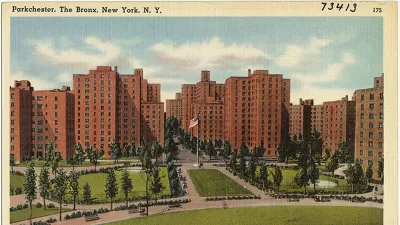A group of investors bought New York City's Stuyvesant Town and Peter Cooper Village in 2006 at the height of the market for $5.4 billion. The speculative deal is now underwater and the investors have decided to walk away from their loans.
From The Wall St. Journal: "Tishman Speyer Properties and its primary partner BlackRock Inc. decided over the weekend to turn over the 56-building complex to creditors rather than pursue other options including potentially putting it into bankruptcy. The move came after the venture was unable to restructure the $4.4 billion in debt used to help finance its top-of-the-market purchase. The decision means that the owners won't use bankruptcy as a defensive strategy to keep control."
Who takes control over the properties is up in the air at this moment. At the time the deal was made, it was the largest real estate deal of its kind in U.S. history.
FULL STORY: Control of Stuyvesant Takes Center Stage

Planetizen Federal Action Tracker
A weekly monitor of how Trump’s orders and actions are impacting planners and planning in America.

San Francisco's School District Spent $105M To Build Affordable Housing for Teachers — And That's Just the Beginning
SFUSD joins a growing list of school districts using their land holdings to address housing affordability challenges faced by their own employees.

The Tiny, Adorable $7,000 Car Turning Japan Onto EVs
The single seat Mibot charges from a regular plug as quickly as an iPad, and is about half the price of an average EV.

Seattle's Plan for Adopting Driverless Cars
Equity, safety, accessibility and affordability are front of mind as the city prepares for robotaxis and other autonomous vehicles.

As Trump Phases Out FEMA, Is It Time to Flee the Floodplains?
With less federal funding available for disaster relief efforts, the need to relocate at-risk communities is more urgent than ever.

With Protected Lanes, 460% More People Commute by Bike
For those needing more ammo, more data proving what we already knew is here.
Urban Design for Planners 1: Software Tools
This six-course series explores essential urban design concepts using open source software and equips planners with the tools they need to participate fully in the urban design process.
Planning for Universal Design
Learn the tools for implementing Universal Design in planning regulations.
Smith Gee Studio
City of Charlotte
City of Camden Redevelopment Agency
City of Astoria
Transportation Research & Education Center (TREC) at Portland State University
US High Speed Rail Association
City of Camden Redevelopment Agency
Municipality of Princeton (NJ)



























